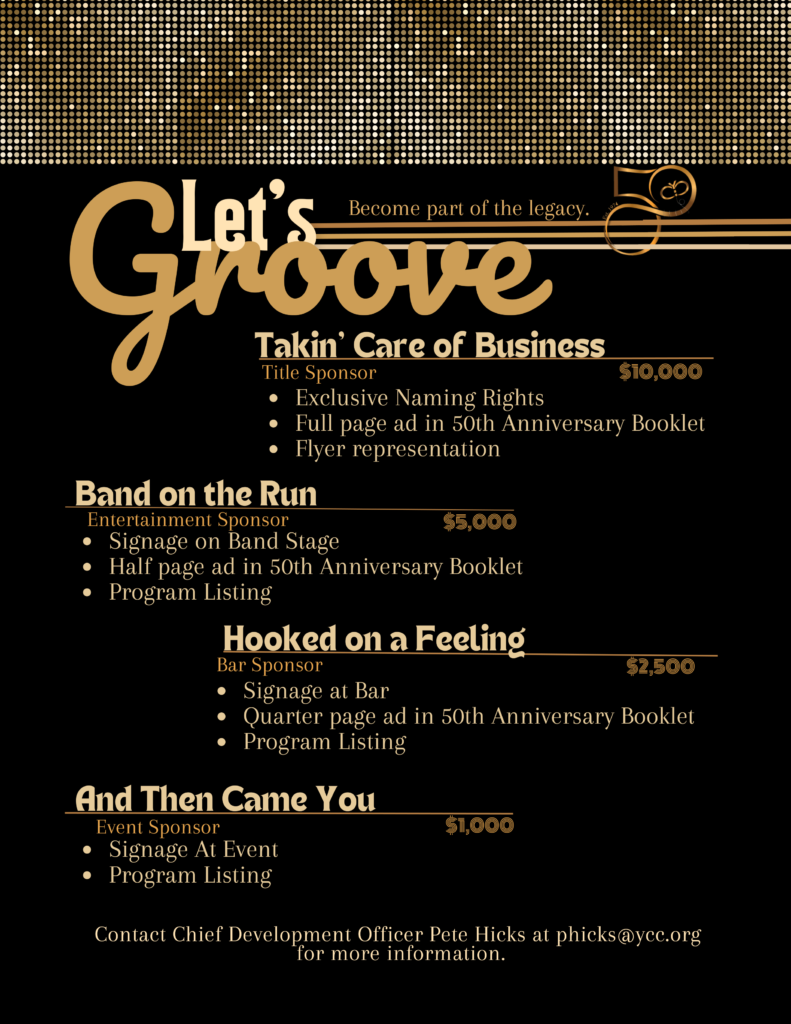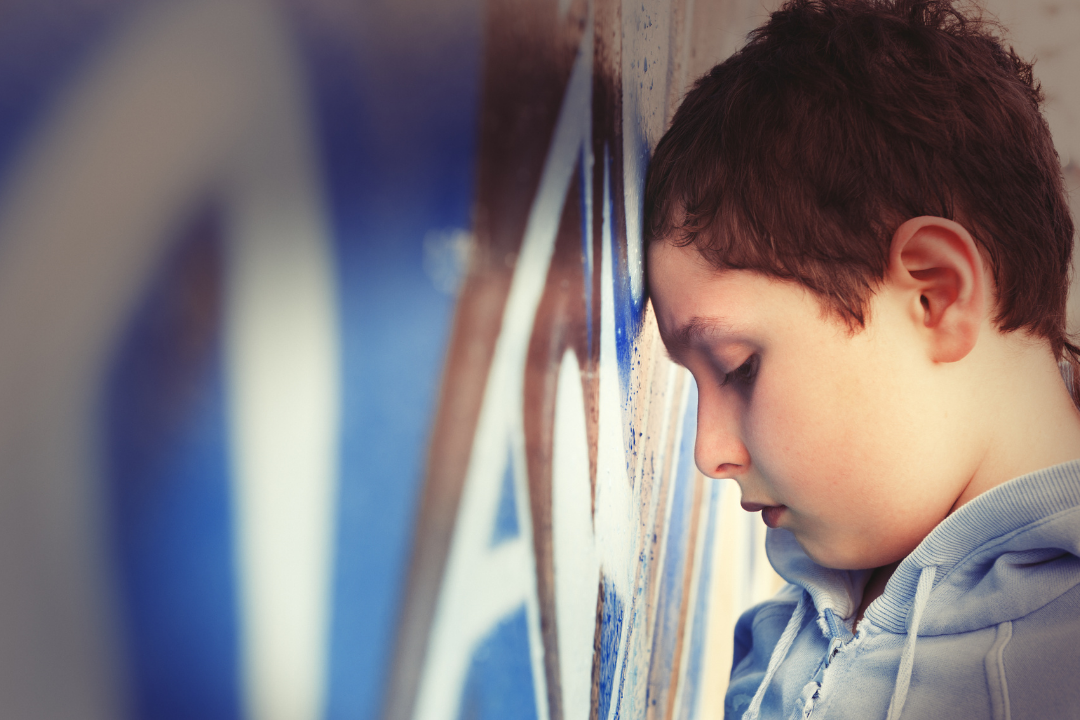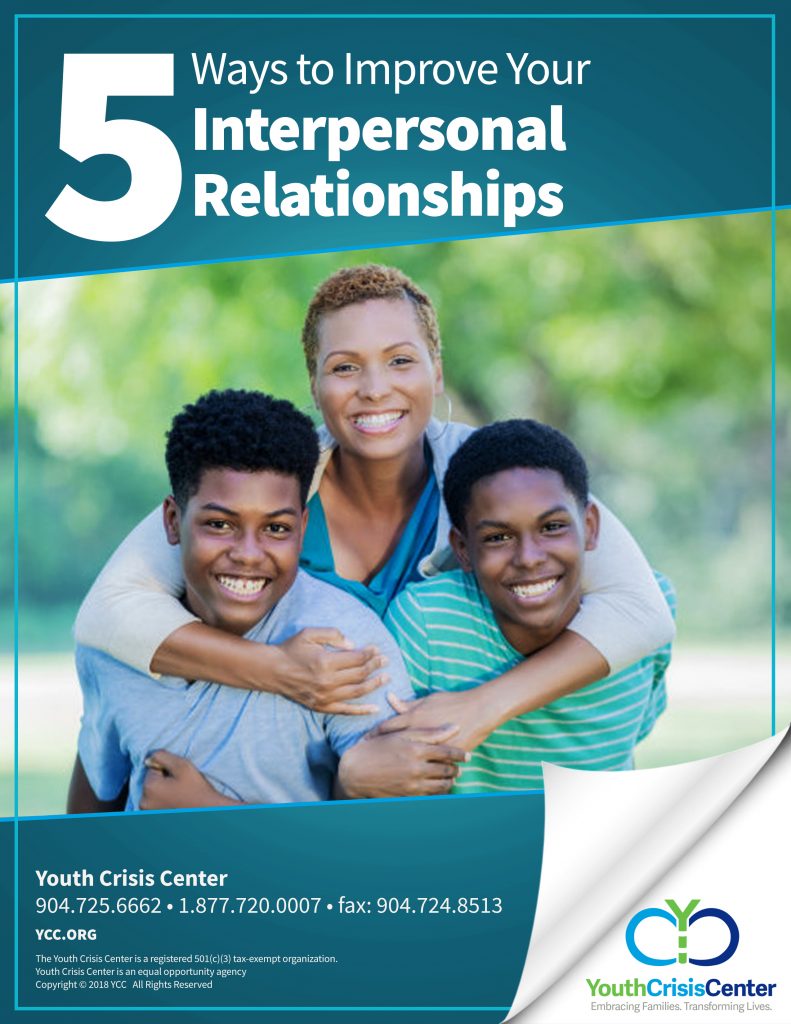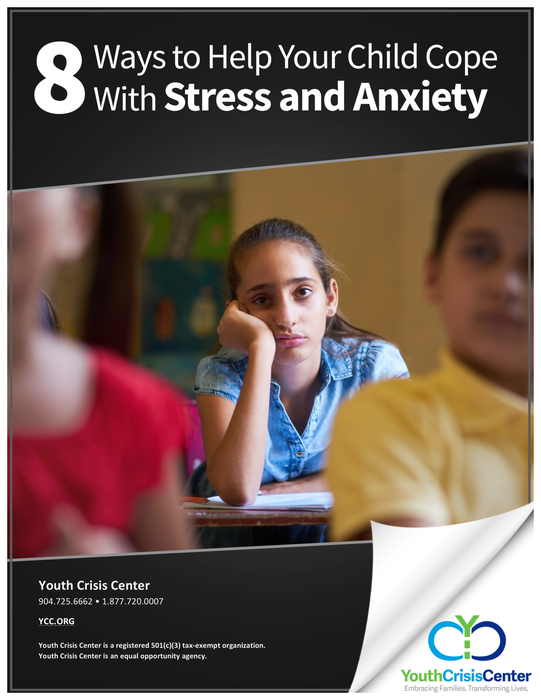Youth Crisis Center (YCC) celebrated its remarkable milestone of 50 years of service with a vibrant 70s-themed party. Decked out in bell-bottoms, platform shoes, and dazzling disco attire, guests danced the night away, enjoying drinks, refreshments, and reminiscing on the organization’s impact. A commemorative photo album captured the essence of the celebration, showcasing heartfelt speeches, joyous moments on the dance floor, and the incredible legacy of support the YCC has provided to countless young people and families over five decades.
 YCC Team
YCC Team
Hayden Hurst Family Foundation Golf Tournament
by YCC Team
February 26th, 2024
Join us for the Hayden Hurst Family Foundation Golf Tournament on February 26th. Enjoy a beautiful day on the course, the chance to win prizes, and an amazing silent auction!

Trivia Night @ Ruby Beach Brewing
by YCC Team
October 26th at 6:30PM
Ruby Beach Brewing – 228 E Forsyth St, Jacksonville, FL 32202
Get your think on at Ruby Beach Brewing for a fun Halloween themed trivia night! Prizes for highest scores and best costume!
2023 YCC Poker Tournament
by YCC Team
YCC’s second annual Poker Tournament is now accepting registration for sponsors and participants. We’re looking forward to another fantastic event of big bids, bigger wins, and more fun than ever before!
Where: Best Bet – 201 Monument Rd. Jacksonville, FL 32225
When: 6pm – Registration | 7pm – Lesson | 7:15pm – Play Begins
Join us as we up the ante, stack the deck, and go all in!
When the chips are down, you’re not going to want to miss this party.

Your child and depression
by YCC Team
No parent or guardian ever wants to see their child suffering whether it’s physical or emotional pain. As parents, it could be easier to tend to a wound you could see, but it could be harder when it’s a wound you can’t see because it’s on the inside.
Identifying Depression in Children
Timely recognition and treatment for children can change, or even save, their lives. Depression consists of persistent feelings of sadness, irritability and hopelessness. This can drastically affect the way one feels, thinks and acts. Quite often, depression is not diagnosed or treated in children because the symptoms are passed off as normal emotional and psychological changes that occur during development. Research shows that about 60 percent of children living with depression are not receiving any form of treatment.
Depression in children presents itself differently than it does in adults, often causing it to be easily missed. Children may not have the emotional maturity or ability to talk about their feelings as an adult might. Symptoms will vary from child to child, but most children with depression will display a noticeable change in their academics, social life and/or self-esteem.
Common Symptoms of Depression in Children Include:
- Bodily symptoms (restlessness, stomachaches, headaches or digestive issues)
- Increased irritability
- Persistent feelings of sadness
- Withdrawal from family, friends or activities they once enjoyed
- Drastic changes in sleep or appetite
- Difficulty concentrating
- Increased fatigue and low energy
- Frequent outbursts or temper tantrums
What Causes Depression in Children?
Genetics and the environment both play a huge role in causing depression in children. With a child who has depression, they will have persistent feelings of sadness, irritability, hopelessness and worthlessness that can be caused by different factors in their life. Children with a family history of violence, substance abuse, physical abuse or sexual abuse are at a greater risk of depression than those without.
Other Common Causes of Depression in Children Include:
- Physical illness (such as diabetes, epilepsy or cancer)
- Harmful environment (community or home)
- Family history of depression
- Substance abuse
- Stressful life events
- The loss of a loved one
Get Your Child the Help They Need at the Youth Crisis Center
When a child’s everyday routine is disturbed by their depressive symptoms, it’s time to get them help. YCC’s Family Link program provides professional and compassionate short-term outpatient counseling services for families with children ages 6-17 who are experiencing any concerns that disrupts the health and stability of the family. These services are available at no cost to residents of Baker, Clay, Duval, St. Johns and Nassau counties through appointments at the child’s school or other community locations. Our therapists have master’s degrees and extensive experience in a wide range of family and youth concerns that include depression, anxiety, attention deficit hyperactivity disorder, chronic behavior problems, homelessness, running away, poor academic performance, and truancy.
Click to learn more about Family Link and the 5 Ways to Strengthen Your Family. All Family Link counseling sessions are confidential. To learn more about services, please call (904) 725-6662.
Shining a Light on National Youth Violence Prevention Week
by YCC Team
During the month of April, the National Youth Violence Prevention Campaign is recognized for one week. This year, National Youth Violence Prevention Week takes place April 12 – April 16th. Around 200,000 homicides occur annually worldwide among youth between the ages of 10-29. According to the World Health Organization, that makes up 43% of the total number of global homicides each year. For those who are lucky enough to survive a violent attack, most will require hospitalization and be affected by lifelong psychological damage.
The goal of the weeklong National Youth Violence Prevention initiative is to raise awareness to educate students, school staff, parents and the general public on effective ways to prevent or reduce youth violence in communities across the country.
Deferment Programs vs. Arrest Records
Jacksonville, Florida, is working to reduce youth violence by intervening at the earliest sign a youth may be in trouble. The deferment program, called the Civil Citation Program, is offered through the Fourth Judicial Circuit for qualified juvenile offenders.
The Civil Citation Program allows law enforcement and juvenile justice stakeholders to issue a citation to qualified juvenile offenders to join the program rather than being arrested and entering the criminal justice system. The purpose of this program is to increase public safety by assessing and referring at-risk, qualified juvenile offenders to intervention programs while also reducing recidivism.
Signs an Individual May Be At Risk for Youth Violence
- attention deficit, hyperactivity, conduct disorder or other behavioral disorders
- involvement in crime
- early involvement with alcohol, drugs and tobacco
- low commitment to school and school failure
- unemployment
- exposure to violence in the family
Teen Court Holds Teens Accountable
After a teen is issued a civil citation, it’s forwarded to the Court Administration Teen Court Director and reviewed to determine which curriculum, under the Civil Citation Program, is most appropriate for that youth. From there, the case will be handled by the Teen Court or one of Jacksonville’s Neighborhood Accountability Boards. Youths are then held accountable for their crimes and are required to complete community service hours and other sanctions that could include individual and family counseling, early intervention, letters of apology or academic monitoring.
This program promotes accountability, immediate intervention and prompt consequences for the qualified juvenile offenders. “This expanded program provides swifter accountability and intervention through smart justice – a benefit to juveniles and taxpayers alike,” said Melissa Nelson, State Attorney for the Fourth Circuit.
Youth Crisis Center Provides Diversion Opportunity
The diversion programs offered by YCC can be completed either through its Outpatient Behavioral Health program or Residential Crisis Care program. Throughout six different programs, YCC provides short-term crisis care, mental health counseling, family therapy, and transitional living services for young adults. “The Youth Crisis Center has been a readily accessible resource for the Jacksonville Sheriff’s Office (JSO) for many years,” said JSO Assistant Chief Adam Pendley. “The services that YCC offers enhance law enforcement efforts by getting to the root cause of what influences youth violence, and transforms their lives by providing them with the help and intervention at an early age.”
Taxpayer Savings
The Civil Citation Program saves taxpayer dollars by producing cost-effective outcomes. Rather than arresting troubled youth, the Civil Citation Program works to identify and address the causes of their misbehavior and enacts disciplinary actions that will discourage them from completing future offenses. Upon successful completion of the requirements of the Civil Citation Program, there will be no arrest on their record.
The Civil Citation Program is important because it prevents life-long consequences associated with juvenile arrests, adjudication, or convictions. “Arrest and prosecution are a first thought for many who consider ways to fight violent crime, but it’s important to remember that arrest for some may do more harm than good,” insists Pendley. “These types of diversion programs, like the Civil Citation Program, still hold the offenders accountable, but in a more proactive way that helps them long term.”
Click to learn more about the Youth Crisis Center’s involvement with the Civil Citation Program.
Are you dealing with a crisis or unmanageable youth? The Youth Crisis Center’s Residential Crisis Care program provides short-term residential services and therapy for youth ages 10-17. Our residential therapists work with youth and their families to address the immediate crisis and help provide long-term solutions to handle future concerns once the youth return home. Click to fill out the Residential Crisis Care form on our website and a therapist will contact you, or call our crisis hotline at (904) 725-6662 to speak with someone immediately. Click more to learn about 8 ways to help your child cope with stress and anxiety.
Local CrossFit Gym Pays Tribute to Suicide Prevention During Pandemic
by YCC Team
“Fight to Flourish” competition amongst athletes and teen participants will be held January 16, 2021
December 14, 2020 — Jacksonville, FL — CrossFit Salt de Terre, a female owned and operated CrossFit gym located just outside Riverside, in the up and coming Railyard District, will be hosting its first annual “Fight to Flourish” competition on January 16, 2021. This competition aims to build awareness about teen suicide by honoring the memory of Cora Schryver, a 13 year old CrossFitter from Ojai, CA, who took her life in 2018. To register for this event click here.
Proceeds from “Fight to Flourish” will benefit the Youth Crisis Center of Jacksonville, FL, in an effort to upgrade the facility’s recreation center. The mission of the Youth Crisis Center is to build a healthier community by empowering young people and families to rise above adversity. CrossFit Salt de Terre aims to give back to the Jacksonville community inside and outside the gym. Members are invited to participate in quarterly give back events for a variety of causes.
Maintaining one’s mental health during this pandemic has been difficult for all ages and suicide rates among adults and teens have gone up during this time. The community at CrossFit Salt de Terre believes in continuing the conversation surrounding this topic in the hopes of saving lives, especially the lives of our youth.
“The team at CrossFit Salt de Terre prides itself in its involvement within the Jacksonville community. We are passionate about health and wellness, physically and mentally, as the two are interchangeable. Our hope is that this event will rally both the CrossFit community, as well as the Jacksonville community to honor those whose lives have been affected by teen suicide, while providing a healthy outlet to engage the public,” said Amy Saltmarsh, owner and head coach of CrossFit Salt de Terre.
All “Fight to Flourish” workouts will be partner style and appropriate for adults and teens of all ages and abilities. Teams can compete in an Adult Only or an Adult + Teen division. Participants will compete in a series of five workouts over the course of the day, and top performers will earn a spot on the podium!
Tickets are $40 per team which includes participation in the competition and a t-shirt.
Sponsorship opportunities are available and appreciated.
For more information about the first annual “Fight to Flourish” competition and CrossFit Salt de Terre, please email Amy Saltmarsh, Owner, at hello@saltdeterre.com.
###
About CrossFit Salt de Terre:
The foundation of any CrossFit gym starts with the people and is built on community. At CrossFit Salt de Terre, a supportive group of coaches and peers will help you along your journey to becoming faster and stronger. We will be there to celebrate your triumphs and help you through your setbacks. CrossFit Salt de Terre aims to give back to the Jacksonville community inside and outside the gym. Members are invited to participate in quarterly give back events for a variety of causes. To start your journey, visit https://saltdeterre.com/.
Youth Crisis Center opens emergency shelter for young adults, House of Hope
by YCC Team
Jacksonville, FL., December 8, 2020 – There is now another option for young adults in Northeast Florida in search of a place to live in the middle of a crisis. After three years of planning, the Youth Crisis Center is pleased to announce the opening of the House of Hope. The House of Hope will serve as an emergency shelter for young adults 18-24, including those who belong to the LGBTQIA+ community. The House of Hope is expected to provide short-term services for about 125 young adults a year for 30 days. This program was made possible due to the partnership with Changing Homelessness, JASMYN, and the amazing help of donors and volunteers at the Youth Crisis Center.
During their stay, staff will help residents with the following:
– Life skills training – Connection for stable and permanent housing
– Mental health counseling – Academic monitoring and support
– Access to medical care – Career development training
The House of Hope includes nine rooms hosting one bed each, a full kitchen, dining hall, private counseling room, life skills training space, sanctuary garden, and a communal gathering space. Each room of the House of Hope is furnished and decorated all thanks to the help of our wonderful donors.
“The House of Hope is needed in this community because statistically the national average of homelessness is 40% as it pertains to the LGBTQ community.”
Kim Sirdevan, the President and CEO of the Youth Crisis Center says rate of homelessness is much higher in Jacksonville. Sirdevan feels the House of Hope can serve as the safe space for the young adults to go to that will offer free services and housing, but an opportunity for them to further their skills for leading to self-sufficiency. The House of Hope is based on being gender neutral, emergency crisis care and with the specific services targeted at homeless young adults. That model is based on the programs YCC already offers on campus like the Residential Crisis Care Program which serves minors and the long-term housing program called Touchstone Village surviving 18-21 year olds. After examining what YCC already offers, it was determined what our community was lacking was the emergency shelter capacity serving the homeless young adults.
About Youth Crisis Center
Founded in 1974 as Florida’s first runaway program, the Youth Crisis Center’s emphasis on care is for those who have been exposed to traumatic situations such as divorce, homelessness, relocation, bullying, loss of life, and abuse. YCC provides a variety of services such as short-term residential crisis care, outpatient therapy, skills-based groups for children and their parents, and transitional living programming for young adults. For more information visit http://www.youthcrisiscenter.org/.
###
Surviving a family crisis
by YCC Team
A family crisis can occur when the family has to change. According to research, a threat to the family’s organization, structure, or culture can cause a crisis. There are several types of family crisis: Death of a family member, loss of a job, natural disaster etc. Not all crises are necessarily negative, even a good change may become a crisis, such as the birth of a baby, retirement, children leaving the home, having a new brother or sister, or adoption.
What deems a crisis is the perception of the family and/or family member to the event, change, or circumstances that are occurring. According to research, families that are often immobilized by stress often have more arguments, may lack cohesiveness and openness among members, lack family activities or quality time together and lack positive communication/conflict management skills. Children will tend to become more stressed and they may show this by displaying more emotional and behavioral problems such as getting into more trouble at home and or at school, experience more sleep disturbances, have trouble paying attention, become more quiet and withdrawn, and often show more signs of worry and anxiety.
Family therapy can be a wonderful tool for families to engage in work on the family dynamic interaction and system as a whole. Families who engage in therapy can help to strengthen their relationship by learning conflict resolution skills, supportive communication, and gain an understanding of one another’s temperaments and perspectives. Parents can also be given psychoeducation regarding positive child behavioral management techniques as well.
Youth Crisis Center’s Outpatient Behavioral Health Program
The Youth Crisis Center was founded in 1974 as Florida’s first run-away program and has grown to be one of the largest and best-known providers of services for youth and families. Nationally recognized as setting a standard in youth services, YCC has been ranked as one of the top five programs in the United States by the Youth Policy Institute in Washington D.C. Throughout the past 46 years, YCC has helped thousands of youth and their families overcome adversity and build stronger relationships.
One of the several programs, YCC offers is Outpatient Behavioral Health. This program provides comprehensive mental health and psychiatric care to kids as young as three and their families. Parents may also receive individual and family counseling regardless if their child is a client at YCC.
Communication in the Family
by YCC Team
How can parents help their kids feel comfortable talking to them?
- One of the greatest ways a can parent help their kid open up communication with them is through learning and nailing the art of validation. The dictionary defines validation as “the recognition or affirmation that a person, their feelings, or opinions are valid or worthwhile.” Validation kindly communicates that you want and are trying to “get” them or their perspective and that their thoughts and feelings are understandable. Reflecting back to your child in your own words a summary or a paraphrase of what they have communicated is a great way of demonstrating that you are listening. It is also an opportunity for the child or teen to clarify what they are saying. Validation is experienced through eye contact, empathy, attentiveness, and a genuine heart to understand rather than get a point across.
- Your child or teen has a deep and immeasurable need to be known in this way. Often times fear or need for control will hijack such conversations and a parent will feel pressure to use the moment to get information, solve a problem, or lecture to instill a lesson or character trait. To the Youth, this feels like a selfish exchange on part of the parent and in many ways it is. A lecture is actually meeting the parent’s need at that moment and not the child’s, even though this usually comes from a place of good intention. The more you practice validation, the more your sense of when your child needs validation more than anything else will become more apparent. Therapists are also happy and ready to help you learn this skill if you need some help!
How to be open with your parents.
Kids, if you would like to be more open with your parents and feel more heard on things that are super important to you or sensitive in nature, sometimes it is helpful to set up a conversation for success by choosing a good time as much as possible and stating your need. For example, “Dad, I want to talk to you about something important and I need you to please (listen well, not interrupt, sit and talk in my room for a bit, etc). This gives your parent a chance to give feedback about the timing and it alerts them about the importance of the conversation. Sometimes it is really helpful to be respectfully blunt in communication but do make sure to appreciate the difference between being direct about an emotional need vs being demanding.
Benefits of Clear Communication
Clear and direct speaking and listening can prevent an untold number of painful and unnecessary conflicts and misunderstandings. Validation and directness in communication build mutual understanding, respect, trust, and ultimately deeper bonding and love between family members.
YCC’s Family Link Program
The Family Link program provides professional and compassionate short-term, outpatient counseling services to families with children ages 6-17 who are experiencing concerns that could disrupt the health and stability of the family. These services are available at no cost to residents of Baker, Clay, Duval, St. Johns, and Nassau counties through appointments at the child’s school or other community locations. Click to learn more about Family Link and the 5 Ways to Strengthen Your Family. All Family Link counseling sessions are confidential. To learn more about services, please call (904) 720-0007.












